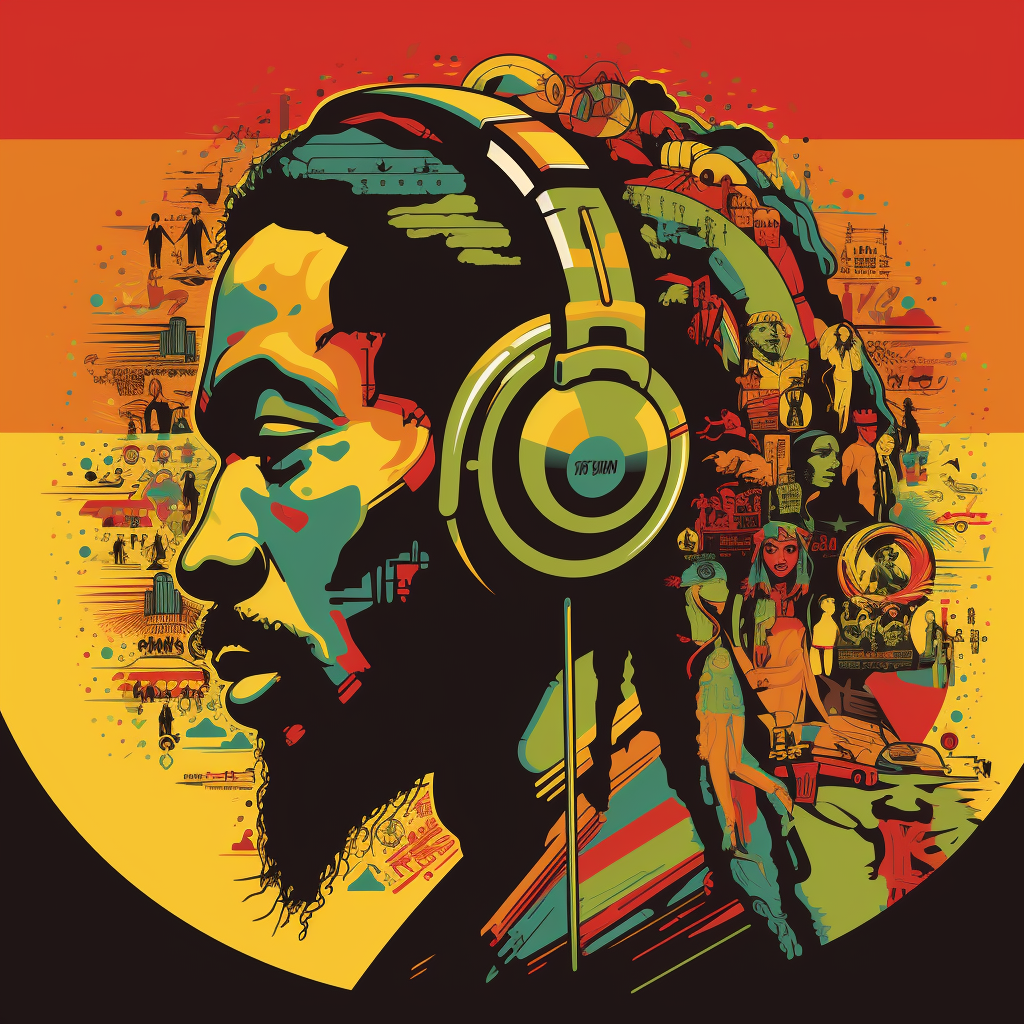
Reggae, a genre born on the Caribbean island of Jamaica in the late 1960s, has grown into a global musical force with a profound cultural impact. The term "reggae" was coined with the release of Toots and the Maytals' "Do the Reggay" in 1968, marking the beginning of a genre that would soon captivate audiences worldwide. Rooted in a rich blend of influences, including traditional mento, American jazz, rhythm and blues, and the earlier genres of ska and rocksteady, reggae is more than just music—it's a cultural movement with deep ties to Rastafari, an Afrocentric religion that emerged in Jamaica in the 1930s.
Reggae and Rastafari
Reggae and Rastafari share a symbiotic relationship, with the music becoming a powerful tool for spreading the messages of the Rastafarian movement. Rastafari, developed in Jamaica in the 1930s, aimed to promote pan-Africanism and quickly became intertwined with reggae. Bob Marley, one of the genre's most iconic figures, played a pivotal role in elevating reggae's international status, concurrently raising awareness of Rastafari. In the eyes of Rastafarians, musicians are messengers, using their craft to advocate for change and share the principles of their faith.
Musical Elements and Style
Stylistically, reggae is a dynamic fusion of rhythm and blues, jazz, mento, calypso, and traditional African folk rhythms. Its signature offbeat rhythms, staccato chords, and slower tempo distinguish it from its predecessors, ska and rocksteady. The bass and drum downbeat, paired with the offbeat rhythm section, create the distinctive sound that is instantly recognizable as reggae. The genre places a strong emphasis on the role of the bass guitar, which carries a thick and heavy sound, and the guitar, which plays on the offbeat of the rhythm.
Notable Figures in Reggae
Reggae's journey to international acclaim has been shaped by influential figures who've left an indelible mark on the genre. From the legendary Bob Marley to pioneers like Toots and the Maytals, reggae's evolution has been guided by the likes of Jimmy Cliff, Johnny Nash, and Lee "Scratch" Perry. As reggae spread beyond Jamaican shores, artists like UB40, Steel Pulse, and Third World further diversified its sound, leading to the creation of subgenres like lovers rock.
Global Impact
Reggae's influence has transcended geographical boundaries, incorporating local instruments and fusing with diverse musical genres. Reggae en Español made its mark in Central and South America, while the UK punk rock scene drew inspiration from the genre. The late 1970s and early 1980s witnessed a surge in reggae's popularity in the UK, with artists such as Steel Pulse and UB40 at the forefront. In 2018, UNESCO recognized reggae as part of the Intangible Cultural Heritage of Humanity, acknowledging its contribution to global discourse on injustice, resistance, love, and humanity.
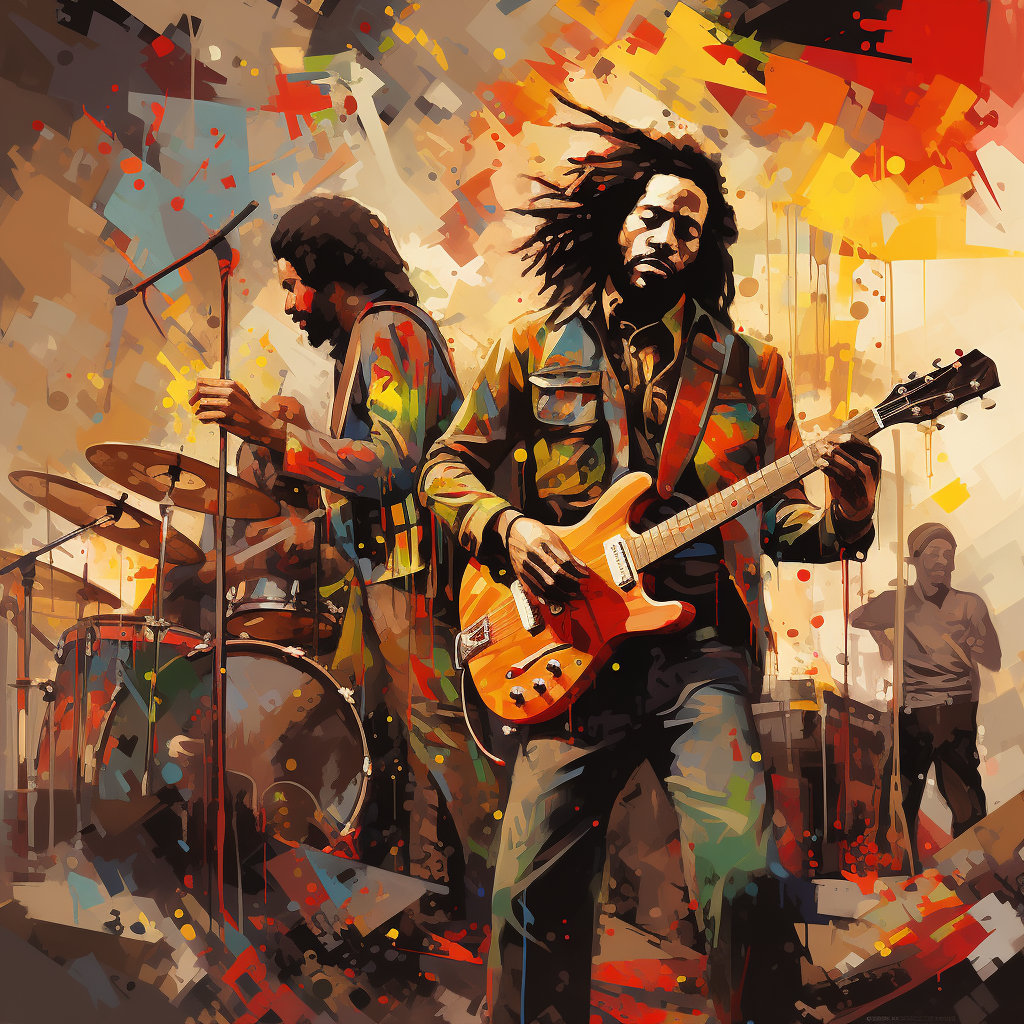
The infectious rhythms and socially conscious lyrics of reggae music gained international acclaim, thanks in large part to the legendary Bob Marley. His influence not only popularized reggae globally but also brought attention to the Rasta way of life. As we explore the rich history of reggae and dancehall, it's essential to pay homage to the Rastafarian musicians who have significantly contributed to the evolution of these genres.
- Bob Marley
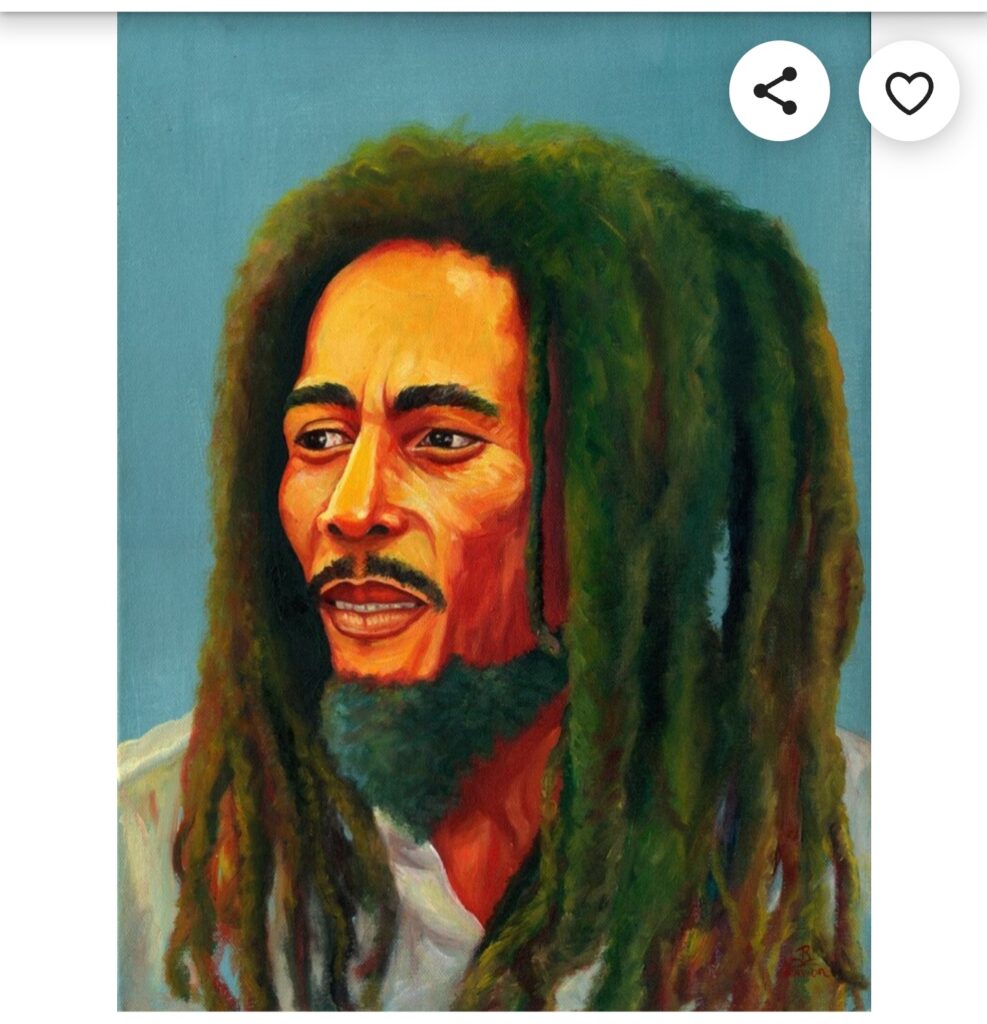
Get this original Bob Marley Painting here by Kavionart. Bob Marley, born Robert Nesta Marley on February 6, 1945, in Nine Mile, Saint Ann Parish, Jamaica, was a legendary Jamaican reggae singer, guitarist, and songwriter. A pioneer of reggae, Marley's music fused reggae, ska, and rocksteady, gaining international acclaim for his distinctive vocal and songwriting style. Born to Norval Sinclair Marley and Cedella Booker, Marley formed the group Teenagers, which later became the Wailers, featuring Peter Tosh and Bunny Wailer.
The Wailers' debut album, "The Wailing Wailers" (1965), included the hit "One Love" and marked the beginning of their rise in the reggae scene. Marley's conversion to Rastafari in the late 1960s influenced the group's musical shift. After signing to Island Records, the band became Bob Marley and the Wailers, gaining global recognition with albums like "Catch a Fire" and "Burnin'" (both 1973).
Marley's breakthrough on the international stage came with the live version of "No Woman, No Cry" (1975) and the album "Rastaman Vibration" (1976). In 1977, he released "Exodus," a critically and commercially successful album recorded in London. Marley's outspoken support for social reforms, advocacy for Pan-Africanism, and his survival of a 1976 assassination attempt in Jamaica added to his global iconic status.
Diagnosed with acral lentiginous melanoma in 1977, Marley continued his music career with albums like "Survival" (1979) and "Uprising" (1980). Despite declining health, Marley toured extensively. His final concert was in Pittsburgh in 1980. Marley passed away on May 11, 1981, at age 36, due to complications from melanoma that had spread to his brain, lungs, and liver.
Posthumously, Marley remains an influential figure. The album "Legend" (1984) became the best-selling reggae album of all time. With estimated sales exceeding 75 million records worldwide, Marley received numerous accolades, including induction into the Rock and Roll Hall of Fame (1994) and a Grammy Lifetime Achievement Award (2001). His impact on music, culture, and social justice endures, with ongoing tributes and honors worldwide.
Bob Marley's impact on the world extends far beyond his musical contributions. His reggae music, with its powerful messages of love, peace, and unity, resonated with people worldwide and became a symbol of cultural and social change. Marley's influence on Jamaica's tourism is immeasurable, as his music played a pivotal role in shaping the country's image. The reggae beats and Rastafarian culture depicted in his songs attracted a global audience, drawing tourists to Jamaica to experience the vibrant and laid-back atmosphere depicted in Marley's lyrics. The reggae legend's legacy has made Jamaica not only a musical hub but also a cultural and tourism destination, contributing significantly to the nation's international appeal and economic development. Bob Marley's timeless music continues to inspire and bring people together, leaving an unforgettable mark on Jamaica's identity and its standing in the global tourism landscape.
2. Peter Tosh

Peter Tosh, born Winston Hubert McIntosh, left an incredible mark on the world as a Jamaican reggae musician and a prominent member of the legendary band, the Wailers, alongside Bob Marley and Bunny Wailer. Tosh's musical journey began in Trenchtown, Kingston, where he learned to play the guitar and joined forces with Marley and Wailer under the guidance of vocal teacher Joe Higgs. The Wailing Wailers, later renamed the Wailers, played a crucial role in the evolution of reggae music, infusing their lyrics with political and social messages inspired by their Rastafari faith. Tosh, a self-taught guitarist and keyboardist, contributed significantly to the band's musical prowess.
In 1974, Tosh embarked on a solo career, releasing his debut album, "Legalize It," a strong advocate for cannabis legalization. Despite facing challenges with Island Records, Tosh continued to create impactful music, promoting messages of equality and justice. His solo albums, including "Equal Rights," "Mystic Man," and "Wanted Dread and Alive," showcased Tosh's distinctive voice and his commitment to expressing his views through music.
Tosh was not only a musician but also a staunch advocate for the legalization of cannabis and a critic of the social and political injustices prevalent in Jamaica. His involvement in anti-apartheid efforts and outspoken stance on cannabis legalization demonstrated his dedication to social causes.
Tragically, Peter Tosh's life was cut short on September 11, 1987, when he was murdered during a home invasion. His untimely death marked the end of a musical icon who had contributed significantly to reggae's global recognition. In his honor, a documentary film titled "Stepping Razor: Red X" was released in 1993, providing a comprehensive look into Tosh's life, music, and his unfortunate demise.
Today, Tosh's legacy lives on through the Peter Tosh Museum in Kingston, Jamaica, and the celebration of International Peter Tosh Day on April 20. His enduring influence is further symbolized by the "Man in Business Suit Levitating emoji," inspired by a 1964 photograph of Tosh. Through his music, activism, and cultural contributions, Peter Tosh remains an enduring figure in the history of reggae and an inspiration for those who continue to advocate for social change.
3. Burning Spear
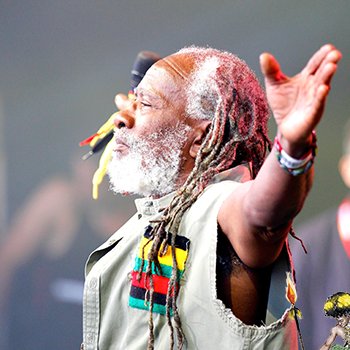
Winston Rodney, better known as Burning Spear, stands as a Jamaican roots reggae luminary, singer-songwriter, and musician. Born on March 1, 1945, in Saint Ann's Bay, Saint Ann, Jamaica, Rodney became one of the most influential and enduring roots artists to emerge from the 1970s reggae scene. Raised in a musical environment, Rodney's early exposure to R&B, soul, and jazz laid the foundation for his distinctive reggae sound. Influenced not only by musical giants like Curtis Mayfield and James Brown but also by the political activism of Marcus Garvey, Rodney's artistry became a powerful vehicle for exploring themes of Pan-Africanism and self-determination.
Burning Spear initially formed as Rodney's group, named after a military award given by Jomo Kenyatta, the first President of an independent Kenya. The group's debut single, "Door Peep," released in 1969 under Coxsone Dodd's Studio One label, marked the beginning of their impactful journey. With a lineup that included bass singer Rupert Willington and tenor Delroy Hinds, Burning Spear's collaboration with producer Jack Ruby in 1975 resulted in the hit "Marcus Garvey" and the album of the same name. The success of "Marcus Garvey" led to a deal with Island Records, propelling Rodney and the group into international recognition.
In 1976, Rodney embarked on a solo journey, using the name Burning Spear for himself alone, and released "Dry and Heavy," showcasing his self-produced work. The album, along with subsequent releases like "Social Living" (1978), demonstrated Rodney's commitment to reggae's roots while incorporating elements of free jazz, funk, and psychedelic music.
Rodney's departure from Island Records in 1980 marked the establishment of the Burning Music Production Company. Over the years, he continued to release albums through various labels, including EMI, Heartbeat Records, and Burning Music, each contributing to his significant body of work. Notably, his 1999 album "Calling Rastafari" earned him his first Grammy Award, a recognition repeated with "Jah Is Real" in 2009.
Burning Spear's extensive touring contributed to the maturation of their live sound, which retained firm roots in reggae while incorporating diverse musical influences. Rodney's commitment to artistic control led to the establishment of Burning Music Records with his wife, Sonia Rodney. In 2007, he was awarded the Order of Distinction in the rank of Officer, recognizing his immense contribution to Jamaican music.
Although Rodney announced his retirement in 2016, he continues to captivate audiences, with performances scheduled at various events, including the Rototom Sunsplash festival in Spain and the 'Welcome to Jamrock' cruise in 2022. His enduring impact on reggae, coupled with his Grammy-winning achievements, solidifies Burning Spear's legacy as a true reggae icon.
4. Dennis Brown
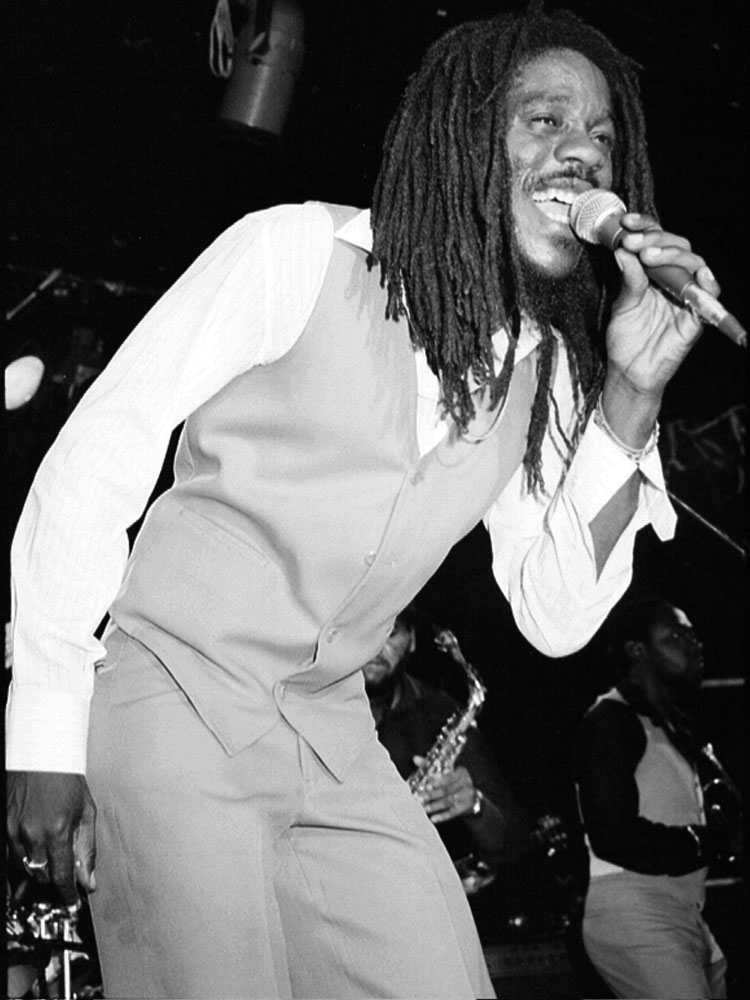
Dennis Emmanuel Brown, born on February 1, 1957, in Kingston, Jamaica, left an indelible mark on the reggae landscape as one of its major stars, aptly dubbed "The Crown Prince of Reggae" by the iconic Bob Marley. Brown's musical journey began at the age of nine, and by eleven, he was already captivating audiences with his soulful voice and engaging performances. Growing up in Kingston, surrounded by a musical family and influenced by American balladeers like Brook Benton and Nat King Cole, Brown's early exposure to music laid the groundwork for his future success.
Brown's debut professional appearance at the age of eleven marked the beginning of a prolific career. His first recording, "No Man is an Island," at the tender age of twelve under Clement "Coxsone" Dodd's Studio One label, quickly became a Jamaican hit. With guidance from fellow artists like Delroy Wilson and Alton Ellis, Brown developed his distinctive singing style and learned to play the guitar.
In 1972, Brown's international breakthrough came with "Money in my Pocket," recorded for Joe Gibbs. This marked the start of a successful association, propelling Brown into the global reggae spotlight. His popularity soared with hits like "Westbound Train" and "Cassandra," showcasing his versatility in both conscious themes and love songs.
While his early career faced a temporary setback due to health issues and rumors, Brown's resilience led him to tour the UK for the first time in 1974, expanding his international reach. He continued to record and tour extensively, embracing the new dancehall era in the early 1980s.
In 1981, Brown signed with A&M Records, solidifying his status as a global reggae ambassador. Despite a shift towards a more commercial sound, he remained a prominent figure in the reggae scene. Brown's collaboration with Gregory Isaacs on the album "Two Bad Superstars Meet" in 1984 and the hit single "Big All Round" in 1989 showcased his enduring influence.
As the 1990s unfolded, Brown continued to produce prolifically, earning a Grammy nomination for his 1994 album "Light My Fire." Sadly, his health declined in the late 1990s, leading to his passing on July 1, 1999. Brown's funeral, attended by political figures and fellow musicians, celebrated his monumental contributions to reggae.
Dennis Brown's legacy endures through his impact on successive generations of reggae artists, including Barrington Levy, Junior Reid, Luciano, and others. In 2001, a charitable trust, the Dennis Emanuel Brown Trust, was established to honor his memory and support educational initiatives. Brown's influence is further acknowledged through tributes like George Nooks' album "George Nooks Sings Dennis Brown: The Voice Lives On" and Gregory Isaacs' "Gregory Isaacs Sings Dennis Brown."
In 2011, Jamaica posthumously honored Brown with the Order of Distinction in the rank of Commander for his significant contributions to the country's music industry. Commemorations, including a blue plaque on his Harlesden home in 2012 and a spot on Rolling Stone's list of the 200 Greatest Singers of All Time in 2023, underscore the enduring legacy of Dennis Brown in the world of reggae.
Dennis Emmanuel Brown, born on February 1, 1957, in Kingston, Jamaica, left an indelible mark on the reggae landscape as one of its major stars, aptly dubbed "The Crown Prince of Reggae" by the iconic Bob Marley. Brown's musical journey began at the age of nine, and by eleven, he was already captivating audiences with his soulful voice and engaging performances. Growing up in Kingston, surrounded by a musical family and influenced by American balladeers like Brook Benton and Nat King Cole, Brown's early exposure to music laid the groundwork for his future success.
Brown's debut professional appearance at the age of eleven marked the beginning of a prolific career. His first recording, "No Man is an Island," at the tender age of twelve under Clement "Coxsone" Dodd's Studio One label, quickly became a Jamaican hit. With guidance from fellow artists like Delroy Wilson and Alton Ellis, Brown developed his distinctive singing style and learned to play the guitar.
In 1972, Brown's international breakthrough came with "Money in my Pocket," recorded for Joe Gibbs. This marked the start of a successful association, propelling Brown into the global reggae spotlight. His popularity soared with hits like "Westbound Train" and "Cassandra," showcasing his versatility in both conscious themes and love songs.
While his early career faced a temporary setback due to health issues and rumors, Brown's resilience led him to tour the UK for the first time in 1974, expanding his international reach. He continued to record and tour extensively, embracing the new dancehall era in the early 1980s.
In 1981, Brown signed with A&M Records, solidifying his status as a global reggae ambassador. Despite a shift towards a more commercial sound, he remained a prominent figure in the reggae scene. Brown's collaboration with Gregory Isaacs on the album "Two Bad Superstars Meet" in 1984 and the hit single "Big All Round" in 1989 showcased his enduring influence.
As the 1990s unfolded, Brown continued to produce prolifically, earning a Grammy nomination for his 1994 album "Light My Fire." Sadly, his health declined in the late 1990s, leading to his passing on July 1, 1999. Brown's funeral, attended by political figures and fellow musicians, celebrated his monumental contributions to reggae.
Dennis Brown's legacy endures through his impact on successive generations of reggae artists, including Barrington Levy, Junior Reid, Luciano, and others. In 2001, a charitable trust, the Dennis Emanuel Brown Trust, was established to honor his memory and support educational initiatives. Brown's influence is further acknowledged through tributes like George Nooks' album "George Nooks Sings Dennis Brown: The Voice Lives On" and Gregory Isaacs' "Gregory Isaacs Sings Dennis Brown."
In 2011, Jamaica posthumously honored Brown with the Order of Distinction in the rank of Commander for his significant contributions to the country's music industry. Commemorations, including a blue plaque on his Harlesden home in 2012 and a spot on Rolling Stone's list of the 200 Greatest Singers of All Time in 2023, underscore the enduring legacy of Dennis Brown in the world of reggae.
In conclusion, the exploration of Rastafarianism and its profound influence on reggae music, as well as the notable figures within the movement, merely scratches the surface of a rich and diverse cultural tapestry. This journey has introduced us to iconic individuals like Bob Marley, Peter Tosh, Burning Spear, and Dennis Brown, whose contributions to reggae and the global recognition of Rastafarian values are immeasurable.
However, the Rastafarian legacy is vast, and there are many more individuals who have played pivotal roles in shaping the movement and its musical expressions. The Abyssinians, Black Uhuru, Israel Vibration, Bunny Wailer, Rita Marley, Sizzla, Richie Soice and Judy Mowatt are among the esteemed figures deserving of acknowledgment for their cultural impact and musical contributions. Furthermore, recognizing the more contemporary voices, such as Ziggy Marley and Damian "Jr. Gong" Marley, both offspring of the legendary Bob Marley, underscores the enduring nature of Rastafarian influence on the reggae genre. Not to mention the modern/current rasta such as Chronixx, Protoje, Kabaka Pyramid and more!
As we delve into the world of reggae and Rastafarianism, it becomes evident that this journey is far from complete. Part 1 has laid the foundation for a more comprehensive exploration, inviting us to delve deeper into the lives, philosophies, and musical legacies of these remarkable individuals. The Rastafarian movement, with its rich history and evolving expressions, continues to inspire and resonate across generations, calling for a continued celebration of its diverse voices and their unprecendented impact on the world of music and culture.
